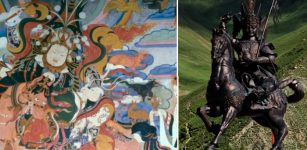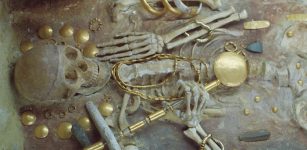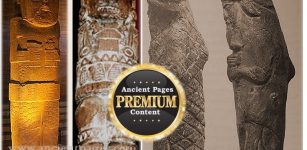Antisthenes And Diogenes – Founders Of Cynicism Were Ancient Greek Philosophers
Ellen Lloyd - AncientPages.com - The concept of cynicism comes from the Greek word for dog ( kynos), but originated in a philosophical school established in ancient Greece.
Denoting their denial of luxuries, wealth, and social status, cynics believe the purpose of life is to live in virtue, in agreement with nature.
Left: Antisthenes, part of a fresco in the National University of Athens. Right: Diogenes of Sinope lived in a barrel in downtown Athens, (by Waterhouse)
This meant satisfying only the most basic requirements of the body by the simplest means possible.
The Cynic School, founded in Athens about 400 B.C., continued in existence until about 200 B.C. The founder of the school was Antisthenes, (c. 445–365 B.C.) a Greek philosopher who was a pupil of Socrates. The best known among his followers is Diogenes of Sinope (c. 412–323 B.C.)
Antisthenes said that desire leads to pleasure and pleasure to the misery of insufficient and temporal happiness. Antisthenes valued virtue more than anything. In his opinion, virtue is the only good, and pleasure is always evil. Self-control is the essence of virtue.
According to his philosophy, wise people learn to above all things to despise material needs and the artificial comforts in which worldly men find happiness.
Self-control, he said, is the essence of virtue, and a wise man will learn above all things to despise material needs and the artificial comforts in which worldly men find happiness. Virtue was according
Nicknamed ‘the dog’ for his vagrant lifestyle, Diogenes was described as ‘a Socrates gone mad’.
Alexander the Great's meeting with Diogenes.
Diogenes took the concept of cynicism to its highest level. Legends tell Diogenes lived in a barrel (actually a kind of storage jar) on the outskirts of the marketplace. He made his living by begging, refusing to wear anything but the simplest of cloth.
Diogenes was sometimes referred to as “Diogenes the dog”, but he was by no means offended by this. To him, it was almost like a compliment because he believed dogs were more in touch with nature. Dogs do not care for social status or material possessions.
The happiest person, who in Diogenes’ phrase “has the most”, is, therefore, someone who lives in accordance with the rhythms of the natural world, free from the conventions and values of civilized society, and is “content with the least”.
Alexander the Great who was his great admirer met the Greek philosopher in Corinth while he was bathing in the morning sunlight. The King of Macedonia asked Diogenes if there was anything he (a man who seemingly had everything) could do for him.
The philosopher responded, “Yes, stand out of my light”. Alexander the Great was said to have been so impressed with the remark that he then stated “If I were not Alexander, I would wish to be Diogenes”.
As a general philosophic principle, cynicism was highly influential upon the later Stoic philosophers.
Written by Ellen Lloyd – AncientPages.com
Copyright © AncientPages.com & Ellen Lloyd All rights reserved. This material may not be published, broadcast, rewritten or redistributed in whole or part without the express written permission of AncientPages.com and Ellen Lloyd
Expand for referencesMore From Ancient Pages
-
 How Emma Of Normandy Risked Her Life To Save England
Featured Stories | Mar 20, 2021
How Emma Of Normandy Risked Her Life To Save England
Featured Stories | Mar 20, 2021 -
 Dazu Rock Statues Of Clairvoyance And Clairaudience: Is One Of them Holding A Snake Or ‘Telephone Receiver” In His Hand?
Archaeology | Mar 8, 2017
Dazu Rock Statues Of Clairvoyance And Clairaudience: Is One Of them Holding A Snake Or ‘Telephone Receiver” In His Hand?
Archaeology | Mar 8, 2017 -
 Strange And Scary Encounter With Ancient Giants In North America
Ancient Mysteries | Sep 23, 2021
Strange And Scary Encounter With Ancient Giants In North America
Ancient Mysteries | Sep 23, 2021 -
 Secrets Of Quipu – Ancient Inca Message Decoded By Student
Archaeology | Dec 27, 2017
Secrets Of Quipu – Ancient Inca Message Decoded By Student
Archaeology | Dec 27, 2017 -
 Extraordinary Archaeological Discovery In Spain
Archaeology | Oct 10, 2023
Extraordinary Archaeological Discovery In Spain
Archaeology | Oct 10, 2023 -
 On This Day In History: Gutenberg Prints The First Bible – On Feb 23, 1455
News | Feb 23, 2017
On This Day In History: Gutenberg Prints The First Bible – On Feb 23, 1455
News | Feb 23, 2017 -
 Ancient Egyptians Invented Toothpaste
Ancient Technology | Dec 26, 2015
Ancient Egyptians Invented Toothpaste
Ancient Technology | Dec 26, 2015 -
 ‘Golden Man’ – Sak Warrior Covered With Thousands Of Pieces Of Gold – More Light On Gold Techniques Used In Kazakhstan
Archaeology | Jan 9, 2019
‘Golden Man’ – Sak Warrior Covered With Thousands Of Pieces Of Gold – More Light On Gold Techniques Used In Kazakhstan
Archaeology | Jan 9, 2019 -
 On This Day In History: Hubble Space Telescope Was Launched – On April 24, 1990
News | Apr 24, 2016
On This Day In History: Hubble Space Telescope Was Launched – On April 24, 1990
News | Apr 24, 2016 -
 They Spoke The Language Of The Gods – Secret Symbols, Unknown Books And Manuscripts – Part 2
Ancient Mysteries | May 23, 2018
They Spoke The Language Of The Gods – Secret Symbols, Unknown Books And Manuscripts – Part 2
Ancient Mysteries | May 23, 2018 -
 Legendary Epic Of King Gesar Who Descended From Heaven And The Ancient Tarna Monastery
Featured Stories | Nov 20, 2021
Legendary Epic Of King Gesar Who Descended From Heaven And The Ancient Tarna Monastery
Featured Stories | Nov 20, 2021 -
 Ancient Secrets Of Dougong Brackets: How 2,500-Year-Old Buildings Could Survive Earthquakes
Ancient History Facts | Jul 31, 2017
Ancient Secrets Of Dougong Brackets: How 2,500-Year-Old Buildings Could Survive Earthquakes
Ancient History Facts | Jul 31, 2017 -
 Archaeology Sheds Light On Why Some Ancient Societies Were More Unequal Than Others
Featured Stories | May 25, 2022
Archaeology Sheds Light On Why Some Ancient Societies Were More Unequal Than Others
Featured Stories | May 25, 2022 -
 Mysterious Water Indians: Brotherhood Of Semi-Divine Beings Described As Half Men And Half Fish
Ancient Mysteries | Jul 8, 2014
Mysterious Water Indians: Brotherhood Of Semi-Divine Beings Described As Half Men And Half Fish
Ancient Mysteries | Jul 8, 2014 -
 First Settlers Of Ancient Peru Left Behind 12,000-Year-Old Stone Objects
Archaeology | Mar 16, 2018
First Settlers Of Ancient Peru Left Behind 12,000-Year-Old Stone Objects
Archaeology | Mar 16, 2018 -
 Chester Stash Could Have Been Savings Hidden In An Iron-Glazed Mug
Archaeology | Oct 13, 2015
Chester Stash Could Have Been Savings Hidden In An Iron-Glazed Mug
Archaeology | Oct 13, 2015 -
 On This Day In History: Coverdale Bible Printed In English For The First Time – On Oct 4, 1535
News | Oct 4, 2016
On This Day In History: Coverdale Bible Printed In English For The First Time – On Oct 4, 1535
News | Oct 4, 2016 -
 Archaeologists Will Excavate Unique Ancient Roman Obelisk Near Lesicheri, Bulgaria
Archaeology | Apr 8, 2016
Archaeologists Will Excavate Unique Ancient Roman Obelisk Near Lesicheri, Bulgaria
Archaeology | Apr 8, 2016 -
 Mysterious Menga Dolmen: A New Very Old Monument Discovered
Archaeology | Sep 21, 2020
Mysterious Menga Dolmen: A New Very Old Monument Discovered
Archaeology | Sep 21, 2020 -
 Secrets Of Maxims Of Ptahhotep – Ancient Egyptian Wisdom Is Still Relevant Today
Artifacts | Mar 10, 2018
Secrets Of Maxims Of Ptahhotep – Ancient Egyptian Wisdom Is Still Relevant Today
Artifacts | Mar 10, 2018


